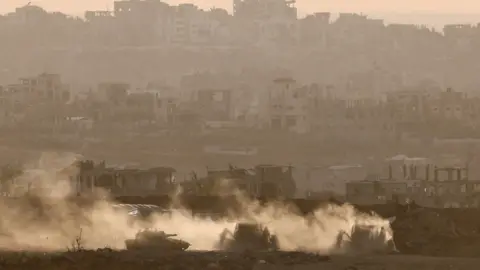The recent decision by Israel’s security cabinet to expand its military offensive against Hamas has stirred significant concern and debate among international communities and humanitarian organizations. As tensions continue to escalate, Israel is gearing up for a more intensive military campaign aimed at reclaiming control over Gaza. This move comes amidst an already unfavorable situation for Palestinians, who are facing severe shortages of supplies following a blockade imposed since early March.
Israel’s military is preparing for the operation by mobilizing tens of thousands of reservists, underscoring its intention to ramp up pressure on Hamas. The objective stated by Israeli military authorities includes the urgent need to bring back hostages and to dismantle Hamas’ military capabilities. However, the implementation of this military escalation is reportedly scheduled to commence only after the upcoming visit of U.S. President Donald Trump to the region, indicating the complicated interplay of international diplomacy and local military actions.
In conjunction with military action, the security cabinet has also put forth a plan for managing humanitarian aid distribution. This controversial move entails a new system involving private companies to deliver assistance in Gaza, signaling an end to a two-month blockade that has led to catastrophic shortages of essential items like food, water, and medical supplies. However, humanitarian agencies have vehemently criticized this plan, asserting it breaches foundational humanitarian principles. They argue it may prevent adequate support reaching those most in need, voicing fear that the plan is more geared toward asserting control over aid than providing genuine assistance.
Prime Minister Benjamin Netanyahu’s security cabinet convened recently to strategize about the Gaza offensive, which had seen a lull after a two-month ceasefire that ended on March 18. Reports reveal a unanimous decision among ministers to facilitate a gradual expansion of ground operations, emphasizing the need to capture more territory. Key aspects of the initial phase of this expansion include establishing a larger buffer zone along Gaza’s borders with Israel and Egypt. This would not only aim to exert pressure on Hamas but also seeks to create leverage for negotiations pertaining to ceasefire conditions and hostage releases.
Critically, the cabinet’s decision reflects a shift in military strategy, from more transient operations to an intent for sustained Israeli occupation of Gaza. Officials have articulated this approach as a departure from prior tactics and suggest that it may afford the Israeli government greater opportunities to shape its future dealings with Hamas.
Further complicating matters, critics of the military strategy have emerged strong against what they view as a folly that prioritizes territorial gains over human lives. Representing families of hostages, the Hostages and Missing Families Forum accused the government of failing its citizens by sacrificing hostages for land. This sentiment resonates among a significant portion of Israeli society, with surveys illustrating that over 70 percent of the population opposes the cabinet’s existing war strategy.
In response to these developments, various humanitarian agencies, including the United Nations, have cautioned that the proposed aid delivery mechanism risks compromising aid integrity and efficacy in Gaza. They argue this approach would forcibly limit essential supplies’ access, particularly endangering vulnerable populations residing in less accessible regions of Gaza. Proposals for humanitarian distributions under these new conditions are seen as inadequate efforts to meet the fundamental needs of the affected Palestinian populace.
The military actions are further contextualized against the backdrop of a severe humanitarian crisis resulting from earlier Israeli military campaigns and the ongoing effects of the blockade, which has left countless families destitute and without basic services. Since the resumption of hostilities following the October 7 attack that led to the deaths and kidnappings of Israelis, Gaza has seen a staggering number of casualties, with reports indicating over 52,000 fatalities according to the Hamas-run health ministry.
In summary, the latest developments in Israel’s military strategy reveal a deepening conflict that raises pressing questions about humanitarian implications and international law. As the situation unfolds, global scrutiny intensifies, demanding a careful balancing of military objectives with urgent humanitarian needs and ethical considerations. The coming weeks will likely be critical in determining both the course of the conflict and the well-being of millions caught in its crossfire.



